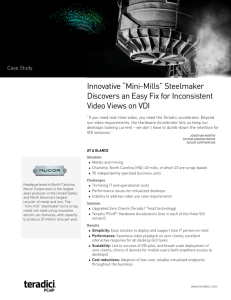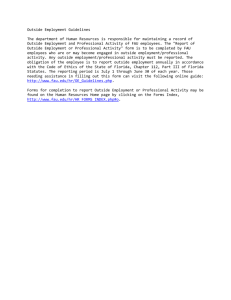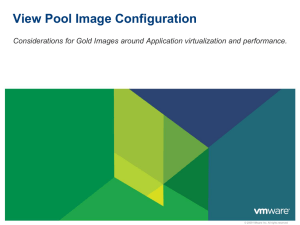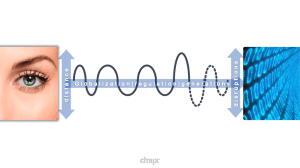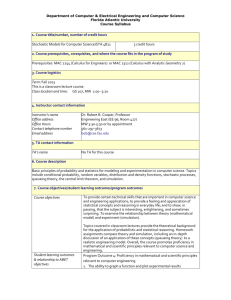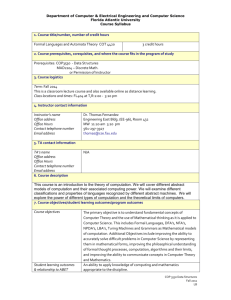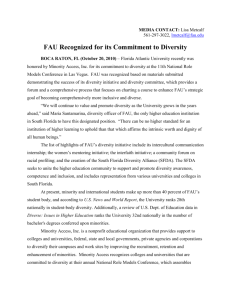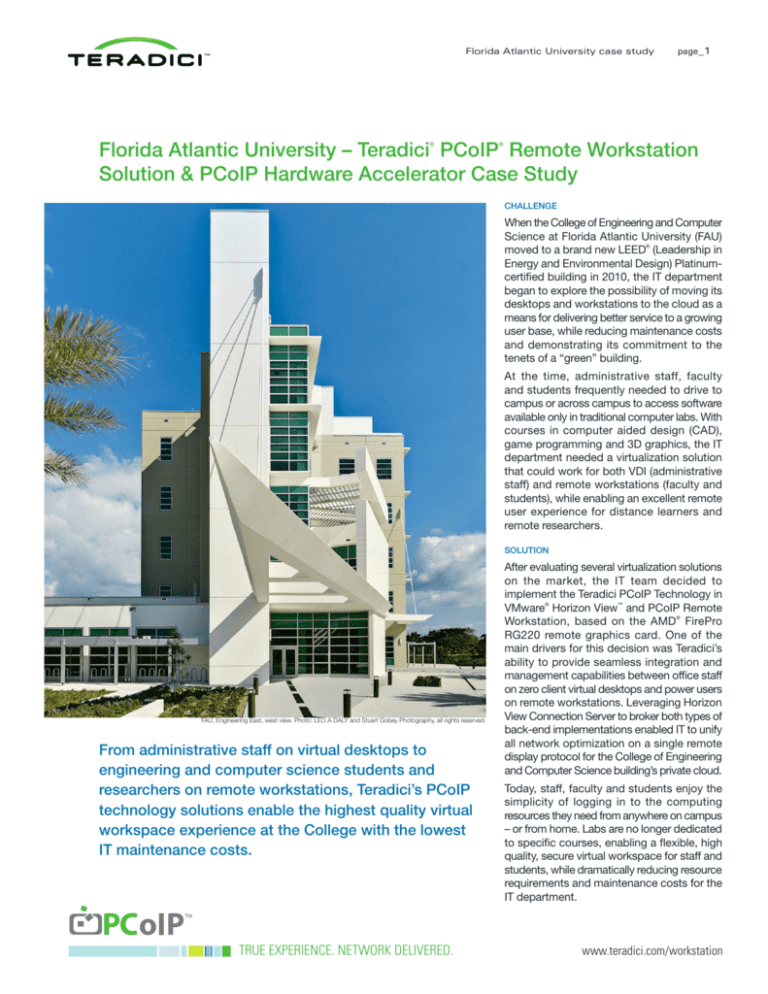
Florida Atlantic University case study
page_1
Florida Atlantic University – Teradici PCoIP Remote Workstation
Solution & PCoIP Hardware Accelerator Case Study
®
®
CHALLENGE
When the College of Engineering and Computer
Science at Florida Atlantic University (FAU)
moved to a brand new LEED® (Leadership in
Energy and Environmental Design) Platinumcertified building in 2010, the IT department
began to explore the possibility of moving its
desktops and workstations to the cloud as a
means for delivering better service to a growing
user base, while reducing maintenance costs
and demonstrating its commitment to the
tenets of a “green” building.
At the time, administrative staff, faculty
and students frequently needed to drive to
campus or across campus to access software
available only in traditional computer labs. With
courses in computer aided design (CAD),
game programming and 3D graphics, the IT
department needed a virtualization solution
that could work for both VDI (administrative
staff) and remote workstations (faculty and
students), while enabling an excellent remote
user experience for distance learners and
remote researchers.
SOLUTION
FAU, Engineering East, west view. Photo: LEO A DALY and Stuart Gobey Photography, all rights reserved.
From administrative staff on virtual desktops to
engineering and computer science students and
researchers on remote workstations, Teradici’s PCoIP
technology solutions enable the highest quality virtual
workspace experience at the College with the lowest
IT maintenance costs.
TRUE EXPERIENCE. NETWORK DELIVERED.
After evaluating several virtualization solutions
on the market, the IT team decided to
implement the Teradici PCoIP Technology in
VMware® Horizon View™ and PCoIP Remote
Workstation, based on the AMD® FirePro
RG220 remote graphics card. One of the
main drivers for this decision was Teradici’s
ability to provide seamless integration and
management capabilities between office staff
on zero client virtual desktops and power users
on remote workstations. Leveraging Horizon
View Connection Server to broker both types of
back-end implementations enabled IT to unify
all network optimization on a single remote
display protocol for the College of Engineering
and Computer Science building’s private cloud.
Today, staff, faculty and students enjoy the
simplicity of logging in to the computing
resources they need from anywhere on campus
– or from home. Labs are no longer dedicated
to specific courses, enabling a flexible, high
quality, secure virtual workspace for staff and
students, while dramatically reducing resource
requirements and maintenance costs for the
IT department.
www.teradici.com/workstation
Florida Atlantic University case study
page_2
Teradici PCoIP Remote Workstation solution
simplified our daily activities. We’ve had
to do more with less. We have to support
an increasing number of students and staff
with the same number of IT staff. If we had
continued with our regular PC infrastructure,
we wouldn’t be able to keep up-to-date.
Software updates, patches, new revisions,
upgrading to Windows 7…any of these
would’ve been near impossible. By using
VMware View, PCoIP and the zero client
technologies, we are able to respond faster to
the changes required by our faculty, students
and staff.
Mahesh Neelakanta, Director of Information Technology
IT server room. Photo: LEO A DALY and Stuart Gobey Photography, all rights reserved.
College of Engineering
and Computer Science
goes green
The College of Engineering and Computer
Science’s new building was the first
academic building of its kind in southeast
Florida to be designed, built and certified
to LEED Platinum-level standards. As such,
FAU and its local community were placed at
the national forefront of energy conservation
and environmental stewardship efforts,
serving as a model for sustainable virtual
computing infrastructures in business and
academia.
The FAU facility hosts approximately 150
faculty and staff members, who provide
teaching, research and lab services to more
than 2,000 students. Notably, 80 percent of
its computer resources are deployed and
centralized in the building’s private cloud,
for both desktops and workstations.
Remote end points are primarily based
on PCoIP zero clients, affording users a
quick, hassle-free installation in less than
15 minutes. Compared to thin clients,
zero clients boast a longer shelf life, lower
power consumption and dramatically
lower hardware failure rates, at less than
one percent (versus 20 percent). In 2011,
the IT team took measures to further
reduce power consumption by installing
14 Super Micro blade workstations with
an x16 slot, thereby eliminating two thirds
of the workstation rack space of the initial
installation.
Performance boost
From the beginning, boosting remote user
performance for workstation applications
was a high priority for the College of
Engineering and Computer Science. Having
implemented a VDI solution several years
before, the IT team recognized the need to
bring workstation performance up to par.
Teradici PCoIP technology was the deciding
factor for choosing the Remote Workstation
Card offered by AMD (RG220) – and
switching to VMware Horizon View for their
virtual desktops.
Teradici’s Remote Workstation Solution
combines an AMD GPU with Teradici
PCoIP technology in a single PCIe x16
card. Installed in the workstation, the card
enables power users to access computing
resources locally or from the cloud without
any loss of graphics performance. Sourced
from a single location without replication
of data, faculty and students can be
productive anywhere within a secure, highfidelity virtual workspace.
Following an extensive evaluation of
implementation options, the team decided
to unify all workstation and VDI back-ends
using a single management interface
(VMware View Broker), with network
settings optimized on a single remote
display protocol (PCoIP) and a single set
of compatible end points. Since the initial
deployment, the College’s IT team has also
moved most of its end points to PCoIP zero
clients.
Hardware acceleration for
desktops and workstations
The College IT team had virtualized the
desktops in all of its classes and computer
labs, in order to pre-empt any performance
and quality issues for graphic-intensive
workloads in the VMware Horizon View
environment. They understood that if
displays lagged, users were not only
frustrated with application responsiveness
but perceived that the computers
themselves were also slow.
To address the issue, they evaluated and
ultimately deployed the Teradici PCoIP
Hardware Accelerator (APEX 2800).
“Teradici offered the exact type of product
we needed to manage higher graphic
content,” says Mahesh Neelakanta, Director
of Information Technology, College of
Engineering and Computer Science, Florida
Atlantic University. “Now, we can ensure a
high-performance user experience without
over-provisioning our server, even in peak
workloads.”
With the recent release of shared GPU
support on VMware Horizon View, the
university is investigating the possibility of
using the PCoIP Hardware Accelerator in
combination with NVIDIA K1 and K2 GPUs
to provide an accelerated 3D experience
for virtual desktops. This will improve the
user experience at the remote end point
and maintain the consolidation ratio without
sacrificing application performance.
Altogether, this unified approach supports
a full spectrum of application requirements,
within a seamlessly integrated environment
at the College, for administrative office
workers and engineering power users alike.
www.teradici.com/workstation
Florida Atlantic University case study
Alumni Hall. Photo: LEO A DALY and Stuart Gobey Photography, all rights reserved.
Engineering Lab. Photo: LEO A DALY and Stuart Gobey Photography, all rights reserved.
page_3
Location independence for
workstations
Simple, easy, system
maintenance
Today, the College’s virtual environment
affords administrative staff, faculty
and students the freedom of a flexible
workspace and access to computing
resources anytime, anywhere.
Initially, the College installed 200 thin
clients and only 60 zero clients, predicting
that zero clients might quickly become
outdated. Ultimately, they’ve proven far
simpler and cost effective to set up, deploy
and maintain. Setup is simply a matter of
opening the box, plugging in the zero client
or integrated monitor, and registering it to
the network with an IP address – all in about
15 minutes. Firmware updates are also
easily implemented via the Teradici PCoIP
Management Console.
“We used to have labs specifically for
computer science students, specifically
for ocean engineering students, specifically
for mechanical engineering,” explains
Neelakanta. “This was needed because the
lab computers had the specific software
they needed. With the cloud, it doesn’t
matter because users are just logging into
a virtual machine. So they log in to a zero
client, connect to a pool and choose which
workstation virtual machine they want to
connect to. With that flexibility, it doesn’t
matter where they are sitting, they can
access the cloud desktop from anywhere.”
So they log in to a zero client,
connect to a pool and choose
which workstation virtual
machine they want to connect
to. With that flexibility, it doesn’t
matter where they are sitting,
they can access the cloud
desktop from anywhere.”
Mahesh Neelakanta
Director of Information Technology
College of Engineering and Computer Science
Florida Atlantic University
In contrast, thin clients consume more
power and hardware failure rates are
dramatically higher, at 20 percent versus
one percent for zero clients. Moreover, the
thin client installation at Florida Atlantic
University has reached end-of-life earlier
than anticipated and is no longer supported
by the manufacturer, which has accelerated
migration to Dell P20 zero clients and P25
zero clients.
Project achievements
Seamless
Integration.
The transition to a simplified, centralized
computing infrastructure is meeting
the demands of a diverse population,
ranging from zero client virtual desktops
for day-to-day office work to virtual
workstations for graphic-intensive
engineering applications (AutoCAD,
SolidWorks, etc.) and research labs.
Simplicity
The College’s IT team is delivering
superior service and support to a
growing population of users at a
significantly lower maintenance cost,
with fewer staff members.
Location
Independence
Students and researchers now have
immediate access to computing
resources from anywhere, at any time,
eliminating the need to commute back
and forth to traditional labs on campus
or across campus.
Atrium. Photo: LEO A DALY and Stuart Gobey Photography, all rights reserved.
www.teradici.com/workstation
Florida Atlantic University case study
page_4
PRODUCTS USED
ABOUT FLORIDA ATLANTIC UNIVERSITY
ABOUT PCOIP TECHNOLOGY
VMware Horizon View 5.2.1
Florida Atlantic University, established in
1961, officially opened its doors in 1964
as the fifth public university in Florida.
Today, the University, with an annual
economic impact of $6.3 billion, serves
more than 30,000 undergraduate and
graduate students at sites throughout
its six-county service region in southeast
Florida. FAU’s world-class teaching and
research faculty serves students through 10
colleges: the Dorothy F. Schmidt College of
Arts and Letters, the College of Business,
the College for Design and Social Inquiry,
the College of Education, the College of
Engineering and Computer Science, the
Graduate College, the Harriet L. Wilkes
Honors College, the Charles E. Schmidt
College of Medicine, the Christine E.
Lynn College of Nursing and the Charles
E. Schmidt College of Science. FAU
is ranked as a High Research Activity
institution by the Carnegie Foundation
for the Advancement of Teaching. The
University is placing special focus on
the rapid development of three signature
themes – marine and coastal issues,
biotechnology and contemporary societal
challenges – which provide opportunities
for faculty and students to build upon
FAU’s existing strengths in research and
scholarship. For more information, visit
www.fau.edu.
The PCoIP® (PC-over-IP®) protocol is a
revolutionary display, encryption and
remoting technology. The PCoIP protocol
compresses, encrypts and encodes the
entire computing experience at the data
center and transmits it ‘pixels only’ across
a standard IP network to stateless PCoIP
desktop devices.
Dell Wyse P20 Zero Clients
Dell Wyse P25 Zero Clients
AMD ATI FirePro RG220 remote
graphics cards
NVIDIA K1 & K2 GRID GPUs
Teradici PCoIP Hardware Accelerator
(APEX 2800)
Teradici PCoIP® Management Console
FAU, Engineering East
PCoIP technology allows an organization’s
PCs and workstations to be centrally
managed in a data center while providing
high resolution, full frame rate 3D graphics
and HD media, with full USB peripheral
interoperability, locally over a LAN or
remotely over a high-latency WAN.
ABOUT TERADICI
Teradici technology is the fabric of the
virtual workspace. We power the spectrum
of local, remote, mobile and collaborative
workstyles, fundamentally simplifying how
computing is provisioned, managed and
used.
Our PCoIP technology is deployed endto-end in virtual environments, delivering
a secure, high-definition computing
experience.
Teradici customers benefit from a broad
product ecosystem, and include Fortune
500 enterprises, governments, and cloud
providers.
ABOUT FAU’S COLLEGE OF ENGINEERING AND
COMPUTER SCIENCE
Florida Atlantic University’s College of
Engineering and Computer Science
is committed to providing accessible
and responsive programs of education
and research recognized nationally for
their high quality. Course offerings are
presented on-campus, off-campus, and
through distance learning in bioengineering,
civil engineering, computer engineering,
computer science, electrical engineering,
geomatics engineering, mechanical
engineering and ocean engineering. For
more information about the College, please
visit www.eng.fau.edu.
Teradici Corporation
+1.604.628.1200
© 2004 – 2013 Teradici Corporation. All rights reserved. Teradici, PCoIP, PC-over-IP and APEX are trademarks of Teradici Corporation
and may be registered in the United States and/or other countries. All other trademarks are property of their respective owners.
Specifications subject to change without notice. CS-24-130829
www.teradici.com/workstation

